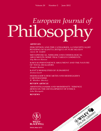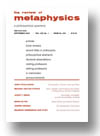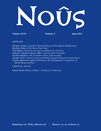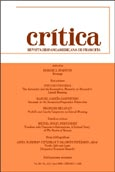
SYNTHESE
Scope & Guideline
Elevating scholarly dialogue since 1936.
Introduction
Aims and Scopes
- Epistemology and Knowledge:
Explores theories of knowledge, justification, and belief, investigating how these concepts apply in various contexts, including science, ethics, and everyday reasoning. - Metaphysics and Ontology:
Addresses fundamental questions regarding existence, reality, and the nature of being, including discussions on properties, kinds, and the relationship between objects and their properties. - Philosophy of Science:
Analyzes the methodologies, assumptions, and implications of scientific practice, focusing on the nature of scientific explanations, theories, and the role of values in science. - Ethics and Moral Philosophy:
Investigates ethical theories and moral reasoning, particularly how epistemic and social factors influence moral judgments and decision-making. - Cognitive Science and Philosophy:
Examines the implications of cognitive science findings on philosophical theories, particularly concerning consciousness, perception, and the nature of mental processes. - Interdisciplinary Approaches:
Encourages dialogue across various disciplines, integrating insights from psychology, sociology, and the natural sciences to enrich philosophical discussions.
Trending and Emerging
- Pragmatic and Contextual Epistemology:
There is an increasing focus on how context influences knowledge and belief, with discussions surrounding pragmatic approaches to understanding epistemic concepts. - Interdisciplinary Integration:
A trend towards integrating insights from cognitive science, sociology, and the natural sciences, leading to more nuanced discussions on topics such as consciousness and social cognition. - Philosophy of Technology and AI:
Emerging themes explore the ethical and epistemological implications of artificial intelligence and technology, reflecting societal concerns about their impact on human cognition and decision-making. - Social Epistemology:
Growing interest in how social factors influence knowledge production and dissemination, including the role of trust, authority, and community in shaping epistemic practices. - Enactivism and Embodiment:
An increasing emphasis on enactive approaches to cognition, which posit that understanding and knowledge are deeply rooted in embodied experiences and interactions with the environment. - Meta-Ethical Discussions:
A notable trend towards exploring the foundations of moral claims and the epistemic status of ethical beliefs, moving beyond traditional normative frameworks.
Declining or Waning
- Traditional Epistemic Theories:
There is a noticeable decrease in papers focused solely on classical theories of knowledge and justification, as contemporary discussions increasingly emphasize pragmatic and contextual approaches. - Analytical Philosophy Exclusivity:
The journal has gradually moved away from strictly analytical philosophies, embracing more diverse and interdisciplinary methodologies that incorporate insights from other philosophical traditions. - Strict Realism in Metaphysics:
Interest in rigid realism regarding metaphysical claims has waned, with more authors exploring pluralistic and contextual perspectives that challenge traditional realist positions. - Normative Ethics Focus:
While ethical discussions remain vital, there has been a reduced focus on normative ethical theories in favor of applied ethics and the interplay between ethics and epistemology.
Similar Journals

EUROPEAN JOURNAL OF PHILOSOPHY
Championing innovative ideas in the realm of philosophy.European Journal of Philosophy, published by Wiley, stands as a premier academic journal in the field of philosophy, recognized for its rigorous scholarship and impactful contributions. With an impressive Q1 ranking in Philosophy as noted in the 2023 category quartiles, the journal places within the top echelons of its field, reflecting its commitment to advancing philosophical discourse. Covering a broad spectrum of philosophical topics, the European Journal of Philosophy features peer-reviewed articles that engage both contemporary discussions and foundational theories, making it an invaluable resource for researchers, professionals, and students alike. The journal's accessibility to readers in the United Kingdom and beyond ensures a wide dissemination of knowledge, fostering an international dialogue that enriches philosophical inquiry. With a convergence of intellectual contributions since 1993, the journal continues to push the boundaries of philosophical thought into 2024 and beyond.

Filosofia Unisinos
Fostering Innovative Insights in PhilosophyFilosofia Unisinos, an esteemed journal in the field of Philosophy, is published by the Universidade do Vale do Rio dos Sinos (UNISINOS) in Brazil. Since its inception, the journal has embraced an Open Access approach, welcoming contributions from scholars globally. With its ISSN 1519-5023 and E-ISSN 1984-8234, it has positioned itself as a vital resource, showing consistent growth in academic circuit, reflected by its Q3 Quartile ranking in the 2023 Scopus category for Philosophy, indicating its relevance and contribution to the discipline. Covering a broad range of philosophical inquiries, from theoretical frameworks to contemporary interpretations, the journal offers a platform for rigorous scholarly dialogue and fosters innovative research. As it moves towards its convergence year in 2024, Filosofia Unisinos continues to be pivotal for researchers, professionals, and students interested in exploring the multifaceted landscape of philosophical thought.

REVIEW OF METAPHYSICS
Illuminating the foundations of philosophy through rigorous discourse.REVIEW OF METAPHYSICS is a distinguished journal published by PHILOSOPHY EDUCATION SOC, INC, dedicated to advancing scholarly discourse in the field of philosophy. With an ISSN of 0034-6632 and an E-ISSN of 2154-1302, this journal has been a crucial platform for philosophical inquiry since its inception in 1975, converging its rich content from 1992 and continuously serving the academic community up to 2022. Based in the United States, specifically at 223 Aquinas Hall, Catholic University America, Washington, DC, it has secured a reputation for quality, reflected in its placement within the Q3 category of the 2023 Philosophy rankings, and a Scopus rank of 367 out of 806 in Arts and Humanities, placing it in the 54th percentile. Although it does not offer open access options, the REVIEW OF METAPHYSICS remains an essential resource for philosophers and students alike, fostering critical perspectives on metaphysical issues, and thereby contributing significantly to the advancement of philosophical studies.

Filozofia Nauki
Cultivating a Global Dialogue on Philosophy and ScienceFilozofia Nauki is a distinguished academic journal published by the Institute of Philosophy at Warsaw University, Poland, with a dedicated focus on the interdisciplinary realms of Philosophy and the History and Philosophy of Science. Since its transition to Open Access in 2020, the journal has broadened its reach, allowing scholars worldwide to engage with its content without barriers. The journal boasts an important standing in the academic community, currently ranked Q2 in Philosophy and Q3 in History and Philosophy of Science as of 2023, reflecting its impact and relevance. With an H-Index indicating its citation influence, the journal aims to foster critical discourse, sharing innovative research and ideas that push the boundaries of knowledge in these fields. Its Scopus rankings, with a percentile of 58th in Philosophy and 41st in the History and Philosophy of Science, further highlight its growing prestige. As it continues to publish cutting-edge research, Filozofia Nauki stands as a vital resource for researchers, professionals, and students committed to exploring the philosophical dimensions of scientific inquiry, ensuring a robust forum for discussion and discovery.

NOUS
Advancing philosophical discourse since 1989.NOUS is a prestigious academic journal published by WILEY, specializing in the field of Philosophy. Since its inception in 1989, it has maintained a strong reputation within the philosophical community, currently earning a remarkable position in the top quartile (Q1) of its category as of 2023. With an impressive Scopus ranking of #22 out of 806 in the Arts and Humanities – Philosophy category, and achieving a 97th percentile, NOUS serves as a pivotal platform for scholarly discourse, innovative research, and critical thinking. The journal prioritizes high-quality articles that contribute significantly to various philosophical debates, thereby attracting both established and emerging scholars. Although it does not offer an open access option, NOUS is a crucial resource for anyone engaged in serious philosophical inquiry and is dedicated to advancing knowledge and understanding in this rich field.

Acta Philosophica
Exploring the Depths of Philosophical InquiryActa Philosophica is a prestigious academic journal dedicated to the exploration and analysis of philosophical thought. Published by Fabrizio Serra Editore in Italy, this journal serves as a vital platform for scholars, presenting rigorous research that contributes to the field of philosophy. With an ISSN of 1121-2179 and an E-ISSN of 1825-6562, Acta Philosophica is indexed in prestigious databases, enhancing its visibility and impact within the academic community. Active since 2011, this journal has emerged as a significant player in the discipline, currently positioned in the Q3 quartile for Philosophy in 2023 and ranked #557 among 806 journals in the Arts and Humanities category on Scopus, placing it in the 30th percentile. Researchers and students alike will find valuable insights within its pages, as it covers a broad spectrum of philosophical inquiries. Although not an open-access journal, its rich content makes it essential reading for anyone invested in advancing philosophical discourse.

CRITICA-REVISTA HISPANOAMERICANA DE FILOSOFIA
Engaging Minds, Shaping DiscourseCRITICA-REVISTA HISPANOAMERICANA DE FILOSOFIA, published by CRITICA in Mexico, is a prominent peer-reviewed journal established in 1977 that has continually contributed to the field of philosophy in the Hispanic world. With an ISSN of 0011-1503 and an E-ISSN of 1870-4905, this journal plays a significant role in disseminating philosophical discourse, engaging both established and emerging scholars. It holds a Q3 ranking in the field of Philosophy according to the 2023 Category Quartiles and is ranked 305 out of 806 in the Scopus Arts and Humanities: Philosophy category, placing it in the 62nd percentile. Although it does not offer an open access option, its commitment to quality and relevance makes it an essential resource for researchers and students eager to explore contemporary philosophical issues and debates. The journal remains a vital platform for intellectual exchange, encouraging diverse perspectives that enrich the landscape of philosophical inquiry.

JOURNAL OF PHILOSOPHY
Fostering rigorous analysis and transformative insights.The Journal of Philosophy, with ISSN 0022-362X and E-ISSN 1939-8549, is a premier academic publication in the field of philosophy, published by J Philosophy Inc. Located in the United States at Columbia University, 709 Philosophy Hall, New York, NY 10027, this esteemed journal serves as a critical platform for rigorous scholarly discourse and innovative research. With a commendable Impact Factor and ranked in the top Q1 category for Philosophy in 2023, the journal holds a prominent position within the academic community, attracting contributions that push the boundaries of philosophical inquiry. The Journal of Philosophy has consistently ranked in the 91st percentile in the Scopus Arts and Humanities rankings (Rank #65/806), underscoring its influence and the relevance of its published works. Though it operates on a subscription model, the journal’s extensive back-catalog and current issues provide invaluable resources for researchers, professionals, and students alike, promoting a deeper understanding of philosophical concepts and stimulating meaningful discussions in contemporary thought.

PHILOSOPHIA
Navigating the Landscape of Philosophical ThoughtPHILOSOPHIA is an esteemed academic journal published by Springer, focusing on the diverse field of philosophy. With an ISSN of 0048-3893 and E-ISSN 1574-9274, this journal serves as a prestigious platform for innovative philosophical discourse and research. Based in the Netherlands at VAN GODEWIJCKSTRAAT 30, 3311 GZ DORDRECHT, PHILOSOPHIA has garnered a reputation for its high-quality contributions, maintaining a Q1 classification in Philosophy and ranking 229 out of 806 in the Scopus Arts and Humanities category, placing it within the top 71st percentile. The journal's scope spans critical analyses and contemporary debates, making it an essential resource for philosophers, scholars, and students seeking to engage with cutting-edge ideas. Although it does not currently offer open access, its rigorous review process and academic integrity ensure that published articles are of the highest scholarly standard. With its convergence of contributions since 1971 and ongoing commitment to advancing philosophical inquiry, PHILOSOPHIA remains pivotal in shaping both theoretical and practical understandings within the discipline.

Open Insight
Exploring the Depths of ThoughtOpen Insight is a prominent academic journal dedicated to the field of philosophy, published by the esteemed CENTRO INVESTIGACION SOCIAL AVANZADA, DIV FILOSOFIA in Mexico. Since its inception in 2017, Open Insight has been a vital platform for the dissemination of innovative philosophical discourse, bridging the gap between theoretical exploration and practical application in contemporary thought. With an ISSN of 2007-2406 and an E-ISSN of 2395-8936, this journal embraces a rigorous peer-review process and is committed to open access principles, ensuring the widest possible reach and impact of published research. Although currently positioned in the Q4 category and ranked 615 out of 806 in the Scopus Arts and Humanities (Philosophy) category, the journal actively encourages submissions that challenge conventional boundaries and inspire new avenues of inquiry. Researchers, educators, and students are invited to contribute their work, investigate philosophical dilemmas, and engage in meaningful discussions that resonate within the academic community and beyond.